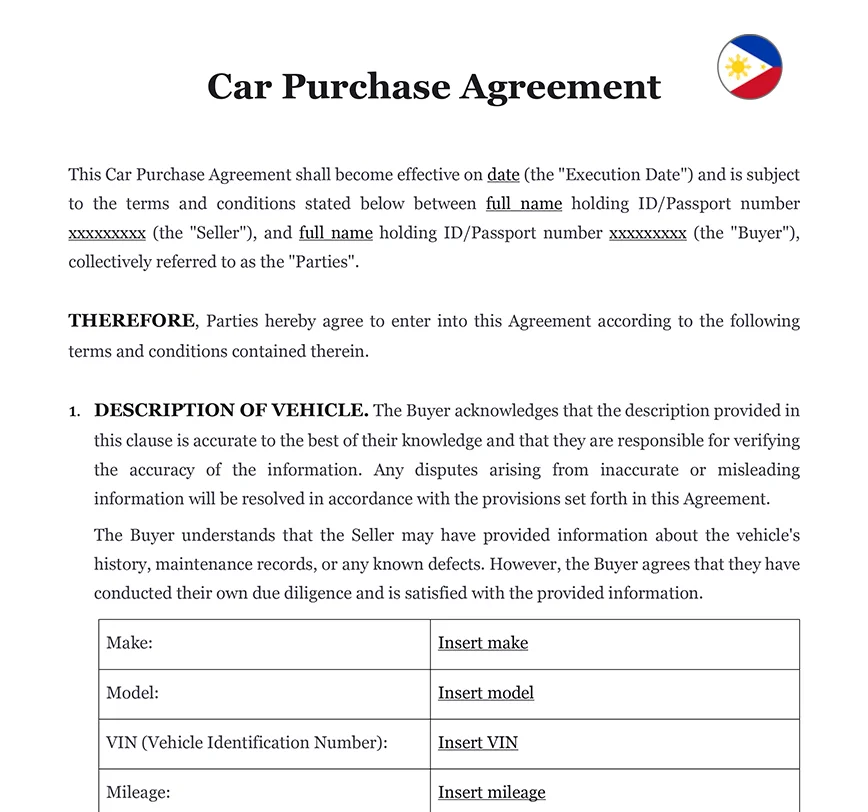Ready to use legal template
Drafted by experienced lawyers
Compliant with Filipino law
Ready to use legal template
Drafted by lawyers
Compliant with Filipino law
Home › Business contracts › Car Purchase Contract
Learn more about Car Purchase Contract in Philippines
Using a Car Purchase Contract in the Philippines is highly advisable when buying or selling a vehicle. This legally binding document serves to protect the rights and interests of both the buyer and the seller. A Car Purchase Contract clearly outlines the terms and conditions of the transaction, including the agreed-upon price, payment method, delivery date, and any additional terms or conditions. By having a contract in place, both parties have a mutual understanding of their obligations, minimizing the risk of misunderstandings or disputes. The contract also provides a record of the transaction, ensuring that the buyer obtains legal ownership of the vehicle and protecting the seller from any liabilities or claims after the sale. Ultimately, using a Car Purchase Contract provides peace of mind and establishes a transparent and secure framework for buying or selling a car in the Philippines.
📄 Related documents
Table of contents
-
What is a Car Purchase Contract?
-
Why to use a Car Purchase Contract?
-
What should a Car Purchase Contract include?
-
How to protect your interests with a Car Purchase Contract?
-
How to transfer ownership of a car to a new owner in Philippines?
-
What warranty and liability includes a Car Purchase Contract?
-
How can disputes be resolved in the Car Purchase Contract?
What is a Car Purchase Contract?
A car purchase contract in the Philippines is a legally binding agreement between a buyer and a seller for the purchase of a vehicle. It outlines the terms and conditions of the sale, including the details of the vehicle, the purchase price, payment terms, and any additional agreements or warranties.
The car purchase contract identifies the parties involved, including their names, addresses, and contact details. It specifies the details of the vehicle being purchased, such as the make, model, year, color, vehicle identification number (VIN), engine number, and registration details.
The contract states the agreed-upon purchase price for the vehicle and may include information about any additional charges, such as taxes, registration fees, or insurance. It also outlines the payment method and schedule, including details about the down payment, installment payments, or full payment. The contract also specifies the date and location of the vehicle delivery, as well as the transfer of ownership process. It may include information about the necessary documents, such as the certificate of registration and deed of sale.
Additionally, the contract may outline any warranties provided by the seller, including the duration and coverage. It may also mention the condition of the vehicle at the time of sale, indicating any known defects or damages. The contract may include provisions for termination of the agreement and the remedies available to the parties in case of breach or dispute.
Why to use a Car Purchase Contract?
A car purchase contract provides clarity and a clear understanding of the terms and conditions of the sale for both the buyer and the seller. It offers legal protection to both parties, ensuring their rights and responsibilities are documented. By having a written contract, it helps prevent misunderstandings or disputes regarding crucial aspects such as the purchase price, payment terms, warranties, and other important details. Additionally, the car purchase contract facilitates the smooth transfer of ownership from the seller to the buyer, providing a legally recognized record of the transaction.
What should a Car Purchase Contract include?
When creating a car purchase contract in the Philippines, there are several key elements that should be included:
| ➤ Parties involved: Clearly identify the buyer and the seller by providing their names, addresses, and contact details. |
| ➤ Vehicle information: Include detailed information about the vehicle being purchased, such as the make, model, year, color, vehicle identification number (VIN), engine number, and registration details. |
| ➤ Purchase price: Specify the agreed-upon purchase price for the vehicle. Additionally, mention any additional charges like taxes, registration fees, or insurance. |
| ➤ Payment terms: Outline the payment method and schedule. This should include information about the down payment, installment payments (if applicable), and the due dates for each payment. |
| ➤ Delivery and transfer of ownership: Clearly state the expected date and location of the vehicle delivery. Include information about the transfer of ownership process and any required documents, such as the certificate of registration and deed of sale. |
| ➤ Warranty and condition: If there are any warranties provided by the seller, include details about their duration and coverage. Additionally, disclose the condition of the vehicle at the time of sale, noting any known defects or damages. |
| ➤ Termination and remedies: Define the circumstances under which the contract can be terminated and specify the remedies available to the parties in case of breach or dispute. |




